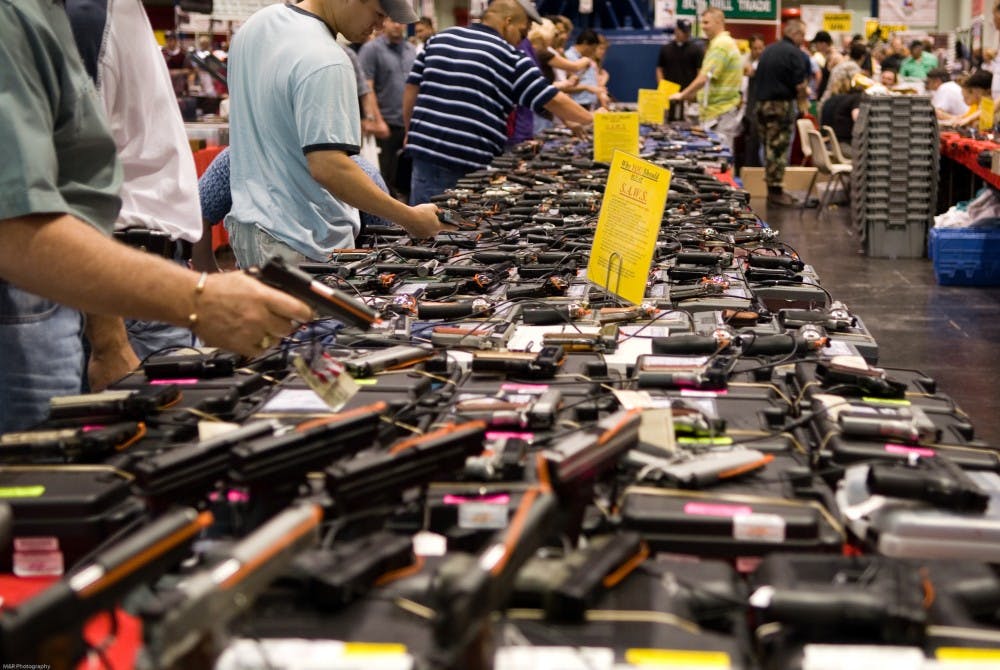By ALEX DRAGONE Senior Staff Writer
Recent gun legislation in Texas has permitted those with the proper permits to have concealed firearms on their person in public university buildings around the state. Texas joins seven other states, not including Maryland, where similar measures are in effect.
Current University policy states that “the possession, wearing, carrying, transporting, or use of firearm or pellet weapon is strictly forbidden on university premises. This prohibition also extends to any person who may have acquired a government-issued permit or license.”
Students have mixed feelings about allowing guns on campus. Hopkins is a private institution, so in the unlikely scenario that Maryland, which has traditionally strong anti-gun legislation, allows for carrying guns on campuses, the bill would likely only apply to public universities.
Senior Nitin Nainani, president of the College Republicans, said he is supportive of gun-rights, but not when it comes to college campuses.
“I’d be a little hesitant to allow firearms on college campuses, even with background checks,” Nainani said. “Most of the school shooters obtained their guns through legal means, they passed the background checks. It’d be hard not to feel less secure [with guns on campus] in the context of school shootings. My parents would definitely feel less secure.”
Senior Charlotte Johnson feels more strongly that guns do not have a place on campus.
“I can’t think of a ‘good reason’ to have a gun at all, and certainly cannot fathom a reason that one would want to have one on campus,” Johnson wrote in an email to The News-Letter. “I think guns are dangerous, and their sole purpose is to kill people. I would feel unsafe on campus if I could unknowingly be talking with someone who has a gun on them.”
While she did not believe that college campuses were an especially dangerous place to have firearms, Johnson wrote that she believes that guns in general should be restricted.
“I’m not a person who believes that more guns is the solution to gun violence,” she wrote. “I just think guns in general add a potential for violence at any point, regardless of what may have ‘provoked’ the violence.” Students have further reactions to the possibility of guns on campus. They cite Hopkins’ stressful atmosphere as a potential reason to forbid students to carry firearms.
“It seems like a bad idea to introduce guns into an environment full of people who don’t necessarily always make the best decisions and are placed in a lot of cases under pressure that may sometimes feel extreme,” senior Dael Norwitz wrote in an email to The News-Letter. “Someone could always snap, and considering there are so many security officers, I don’t see that the [personal] protection argument holds much weight.”
Nainani agrees that a college campus is a unique environment, a factor which should be considered in the context of gun laws.
“College kids have the reputation of being more prone to accidents,” Nainani said. “You’re partying, you’re having fun, there’s less supervision. I know people here who like their guns and they like to shoot, but I’m not sure about letting them have guns on campus. I’d be fine with having the conversation, though.”
The law has divided students and faculty in Texas, with some professors claiming the law attacks freedom of speech since they will not feel comfortable hosting open discussions when some students may be armed in the classroom. Supporters have argued the bill only allows those who have already been permitted by the state to carry guns on campus and that armed people on campuses could prevent or stop a mass shooter event.
In June, Governor Greg Abbott (R) of Texas signed Senate Bill 11, allowing guns in buildings on campus. The bill will go into effect on Aug. 1, 2016, 50 years to the day on which Charles Whitman killed 14 and wounded 32 in the University of Texas at Austin (UT-Austin) Tower sniper incident.
Anyone with a Texas-issued concealed carry permit has been allowed to have concealed firearms on public university campuses for 20 years. In that time, there have been no mass shootings at Texan public universities.
The new law will now extend that freedom to public university buildings, though each campus will have some discretion in applying the law and will be able to designate some buildings as gun-free.
However, Maryland is a “may-issue” state when it comes to granting concealed carry permits. Maryland makes no distinction between concealed and open carry. To apply, citizens must pay a $70.00 application fee along with a $5.00 fingerprint fee.
The permit is valid for two years, after which citizens must pay $50.00 for every subsequent three-year renewal.
The requirements for a permit include being over 18 years old, never having committed a felony or a crime that resulted in over one year imprisonment, having no addiction history with drugs or alcohol, no stays in juvenile detention in the past ten years and having no propensity toward instability or violence.
The applicant must have a “good and substantial reason” to bear a firearm and the firearm should be “necessary as a reasonable precaution against apprehended danger.”





